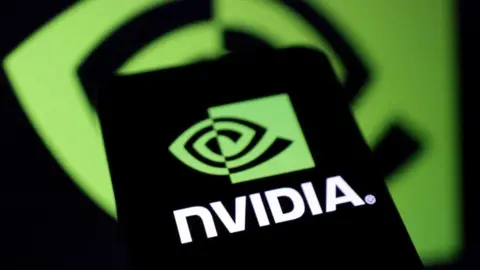**Nvidia Surpasses Expectations Despite Tariff Woes**
**A Surge in Revenues**
Recently, Nvidia, a prominent name in the chip design industry, announced a remarkable increase in revenue for the first quarter of the fiscal year. The company reported revenue growth exceeding 69% compared to the same period last year. Alongside this impressive growth, profits also saw a significant rise, showcasing the firm’s strong foothold in the tech market. Jensen Huang, Nvidia’s CEO, emphasized during a press release that the demand for their AI infrastructure is “incredibly strong” and expects this drive for AI computing to accelerate further.
**Key Role in AI Computing**
Nvidia’s sophisticated chip technology has played a crucial role in powering equipment designed for artificial intelligence applications. As AI continues to evolve and become integral to various sectors, Nvidia’s advanced technologies position the company favorably among tech giants. The recent earnings report comes amidst a positive earnings season for major technology firms, evidenced by significant stock surges.
**Challenges from Tariffs and Trade Policies**
Despite the upbeat financial results, Nvidia has faced challenges stemming from geopolitical uncertainties, particularly surrounding tariff policies instigated by the U.S. government under President Trump. Tech stocks, including Nvidia, experienced a downturn in April amid these uncertainties. In light of these tariffs, Nvidia revealed that it incurred a notable charge of $4.5 billion during the quarter due to decreased demand for its “H20” products, specifically designed for the Chinese market. The company initially projected this charge to be even higher at $5.5 billion but managed to reduce it.
The introduction of new export controls and tariffs has added complexity and costs to Nvidia’s supply chain, which could continue to burden operations. Specifically, Washington’s restrictions on the sale of certain chips deemed difficult to sell outside China significantly impacted Nvidia’s trade activities. In response to these hurdles, Nvidia announced plans to enhance its manufacturing capabilities within the United States to fortify its supply chain.
**Criticism of U.S. Policies**
Commonly referred to as “failures,” these U.S. regulations limiting advanced chip exports to China have drawn sharp criticism from Huang. He argues that these measures could backfire against American companies that rely on international trade and collaboration. This sentiment echoes broader concerns about the effectiveness of such restrictive policies as various stakeholders reflect on their implications for the U.S. technology landscape.
**Geopolitical Pressures Remain**
The Financial Times reported that President Trump has taken further steps to enforce these export controls by directing U.S. companies to cease selling chip software to Chinese manufacturers. This move aims to impede China’s capacity to develop advanced chips that could rival Nvidia’s offerings. According to analysts, the restrictions highlight the immediate and pressing pressures from geopolitical tensions, a dynamic that Nvidia must navigate astutely to maintain its competitive edge in a rapidly evolving marketplace.
**Expanding Horizons in New Markets**
Interestingly, the expanding global demand for AI technologies also presents opportunities for Nvidia. The firm has accessed new markets, particularly within the Gulf states, where interest in AI infrastructure is witnessing unprecedented growth. Earlier this month, Huang accompanied President Trump on a trip to the Middle East, where Nvidia successfully secured a substantial sale of its AI chips to Saudi Arabia.
Huang articulated this ongoing transformation, stating, “Countries around the world are recognizing AI as essential infrastructure—much like electricity and the internet—and NVIDIA stands at the center of this profound transformation.” This expounds on the company’s critical role in global technological advancement, indicating that its influence extends far beyond the U.S. market.
**Conclusion**
In summary, Nvidia’s recent financial performance underscores the robust demand for AI technologies while simultaneously reeling from the negative impact of tariffs and U.S. export restrictions. The firm is proactively adjusting its manufacturing strategies and expanding its international presence to combat these challenges. As the narrative unfolds, Nvidia remains poised to play a pivotal role in global technological progress, navigating both opportunities and challenges in an increasingly complex landscape.



